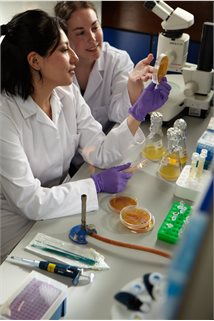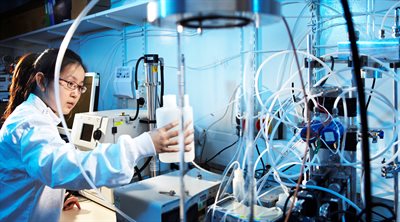We span an enormous breadth of disciplines, from the biomedical to the social sciences, and our expertise aligns strongly with key international challenges, including lifelong health and well being, food security, energy security, and living with environmental change. We've recently had the addition of the Centre for Urban and Regional Studies (moving from the Business School to GEES) and the Department of Sport Pedagogy (moving from the School of Education to the School of Sport and Exercise Sciences).
The 2008 Research Assessment Exercise (RAE) conducted by the Higher Education Funding Council for England (HEFCE) confirmed the pre-eminence of our School of Psychology, with 80% of our research falling in the highest two categories, 3* (internationally excellent) and 4* (world-leading), placing us in the top three nationally with Cambridge and Oxford. Sport and Exercise Sciences achieved a rating of 60% activity at 3*and 4*, placing us top with Loughborough. Biosciences and Geography, Earth and Environmental Sciences have distinctive areas in which they are internationally leading, including environmental science, molecular cell biology and molecular microbiology. With regard to the latter, we have recently formed an Institute of Microbiology and Infection, bringing together researchers from the School of Biosciences with scientists and clinicians in the College of Medical and Dental Sciences, allowing us to integrate our basic scientific and translational research in this key area.

Our strategy is to build around our strengths and to bridge these to cognate areas of activity both within the College and across the University. We have invested in new staff at both early career and professorial levels in each of our four Schools and have attracted more than fifteen independent research fellows in the last year alone. Academic staff are encouraged and supported to ensure that they can achieve their personal best, through advice and guidance from both senior academics and research support professionals.
The College has benefitted from significant University investment in key interdisciplinary research initiatives, including: Computational Neuroscience and Cognitive Robotics (in partnership with the School of Computer Science); Systems Science for Health (in partnership with the Schools of Mathematics and Computer Sciences and the College of Medical and Dental Sciences); and Resilience and Urban Living. These initiatives are not only helping to boost our research awards but are also designed to deliver new Masters level programmes, which are targeted at both UK and international students.
A new exciting development is a joint venture with the Beijing Genomics Institute (BGI), which will provide a world-class research and training centre on Birmingham’s campus that integrates state-of-the-art approaches in molecular biology, including DNA sequencing, metabolomics and bioinformatics. Research will focus in three key areas: ways in which organisms respond to environmental change and the development of novel environmental diagnostic techniques; better understanding of disease susceptibility and treatment including advances in personalised health care and medicine; and advancing our understanding of the role that microbes play in infection and disease.

Experimental research within the Air and Atmosphere Labs
The College project portfolio reflects the breadth of funding that we attract, including links with industry, charities and policy makers, as well as research councils. For example, a Knowledge Transfer Partnership (KTP) with EON is identifying, modeling and predicting the impact of urban heat islands and climate change on the ageing rate of transformers while research on urban resilience is informing spatial planning and national security policy in both the UK and overseas (US, Russia and Israel). The outcomes of our fundamental and applied research have resulted in commercialisation activity. For example, a new clinical diagnostics system developed within the School of Biosciences resulted in the spin-out company Linear Diagnostics. Studies on stroke rehabilitation in our School of Psychology have spawned Cognition Matters. Knowledge transfer is recognised by the College as an integral part of research.
All of our research groups have international collaborators. As part of the University’s international engagement strategy, we are building multi-disciplinary links with key partners across the globe and our College is at the forefront of these in USA (Chicago), India (Delhi) and China (Guangzhou). For example, our School of Psychology is conducting joint research with colleagues in the University of Chicago on social neuroscience, colleagues in GEES are working on sustainable cities with TERI University in Delhi as well as with partners in Guangzhou on environmental pollution.
For more information regarding research within the College, and to find out the research themes within the indiviudal Schools, please see the College Research Brochure.